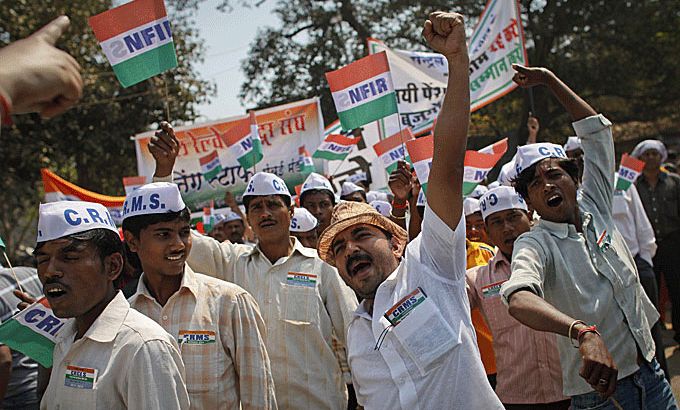
Indian strikes: Livelihoods or politics?
As millions demand better pay and working conditions, we ask what the real motives are behind the paralysing strikes.
|
“There are billionaires in India. Their numbers are increasing, at the same time the number of people below the poverty line is also increasing .… There is no excuse for non-payment of a minimum wage. The government is supporting the corporations, and it wants foreign direct investment with a union-free environment.” – Mahar Devan, All-India Trade Union Congress deputy general-secretary |
Ground to a halt. Hundreds of millions of people go on strike in India.
Eleven major trade unions have gone head-to-head with the government, calling an all-out strike which has paralysed large parts of the country.
Keep reading
list of 4 itemsWhy are nations racing to buy weapons?
Parallel economy: How Russia is defying the West’s boycott
US House approves aid package worth billions for Ukraine, Israel
The 24-hour action has brought transport to a halt, and forced banks, businesses and factories to close.
The unions are demanding better pay and conditions.
This is the latest test for a government badly shaken by a series of scandals and protests.
More than 200 million people are estimated to be taking part in the strike across the country.
|
“The people who are on strike are doing it for very different motives. The centre-right party, the BJP, is trying to undermine the capacity of this coalition government to rule. Then there are the union leaders who are facing a declining membership. Thirdly there are the left-front parties who are also trying to pressure the government.” – Lawrence Saez, South Asian Politics professor, SOAS |
The action is backed by 11 main recognised trade unions, and joined by another 5,000 unaffiliated unions.
But the action comes at a bad time for India’s economy, which is growing at its slowest rate in three years – seven per cent in the fiscal year ending in March. That is down on earlier predictions of nine per cent.
And although inflation did drop recently from 9.1 per cent to 7.5 per cent, it remains high.
The government has a budget deficit of $45bn, which it is trying to reduce by selling assets.
What will this show of force achieve? And how will the already struggling government react?
Guests joining presenter Shiulie Ghosh on Inside Story are: Shailendra Kumar Pande, the general-secretary of the Delhi Union of Journalists; Mahar Devan, the deputy general-secretary of the All-India Trade Union Congress; and Lawrence Saez, a professor of South Asian Politics at the School of Oriental and African Studies (SOAS).
|
“This has been an unprecedented strike. For the first time there was a unison of many factors and forces. In totality there should have been negotiations with the government and employees much earlier. There has to be a desire to talk, not just a decision to talk.” Shailendra Kumar Pande, the general-secretary of the Delhi Union of Journalists |
|
The unions’ key demands: An enforcement of basic labour laws and to stop the violation of workers’ rights; a new national minimum wage; a universal social security fund for unorganised (non-unionised) workers; permanent jobs for 50 million contract labourers; an end to selling off profitable public sector companies; and more government efforts to rein in the rising cost of living. |